Even for someone like myself, who has lived for over 8 years in Barcelona, and is therefore used to all sorts of shenanigans by the local governments, these last few months have been quite remarkable. Many people in Catalonia have been sleeping rather uneasily, waking up anxious every morning, dreading to open any news website for fear of having to read about the latest political nonsense committed by their so-called leaders. And well, on Friday this week, the time had finally come, and we all woke up to find ourselves as citizens of the newly declared banana republic of Absurdistan. A new republic, outside the EU, recognized by no country, without any democratic legitimacy or valid currency, i.e., without any plan, justification, or means whatsoever to support its functioning as a separate country; but hey, it sure felt good to have declared it anyway.
Events in Catalonia had been escalating for years, and have now culminated in a unilateral declaration of independence from Spain. How did it come to this? In short: years of inept leaders, both in Barcelona and Madrid. The long version is a bit more complex. For starters, while most elected leaders in the civilized world would try to find conciliatory words after coming to power, along the lines of: “I will be a president, not only of my supporters, but a president of all Catalans” (replace with whatever country/region), the Catalan President Puigdemont made it clear from the very beginning, that he did not care very much for the over 52% of Catalans1, who did not vote for his mono-thematic pro-independence coalition.
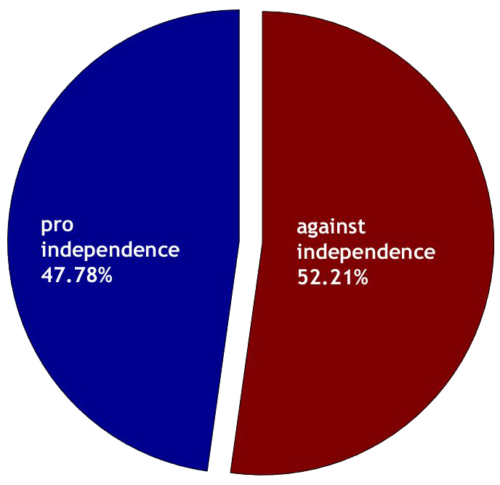
This is actually the closest they have ever come to gaining a majority, because in subsequent months, the independence movement steadily lost some steam, and by July 2017, only 41% of Catalans supported independence2,3.
Unfortunately, this lack of democratic legitimacy has never been a major concern to the independence camp, and it certainly did not stop successive populist Catalan governments from misappropriating public funds to continue a highly one-sided, divisive, and inflammatory independence campaign, forcing a singular Catalanist viewpoint and single Catalan language onto a heterogeneous, multi-cultural, and thus multi-lingual population. Thanks to far reaching autonomies for the Spanish regions, many Catalan school children nowadays graduate from high school, having been brainwashed into hating their own country, purposefully rendered only borderline capable of expressing themselves fluently in Spanish.
This deep rift between Barcelona and Madrid has been created by successive Catalan governments employing the very popular blame game, where regional governments, instead of taking responsibility for their own shortcomings, choose the more convenient approach of assigning all blame to the next higher level of government. While this game is as old as politics itself, it is a dangerous game to play, and quite recently we have seen another example where this game had been taken a little too far, and things went awfully wrong: the Brexit disaster in the UK. While London blamed Brussels for many of its own shortcomings, Barcelona blamed Madrid, and Madrid stood idly by, even pouring the occasional oil on an already raging fire. So this is not to say that Brussels or Madrid are entirely blameless, but most of the arguments in the Brexit and Catalan independence campaigns can be easily unmasked as populist falsehoods, designed to con a gullible population, scared by the aftermaths of neo-liberal politics and untamed globalisation, into believing in some romantic utopia of national independence and self-determination. Let us look at some of the main arguments during the Catalan campaign more closely:
Claim 1: Suppression by Madrid
A myth, that is widely perpetuated by the Catalan government, is that Catalonia lives under the yoke of the central government in Madrid, with some claims going as far as to say that Madrid employed Franco-style methods. Let us look at the facts. While the Catalan culture and language were indeed suppressed under the dictatorship of Francisco Franco, this dictatorship ended with Franco’s death in 1975, and Spain since transitioned to a democratic form of government. Freedom House4 awards Spain one of the highest scores for political and civil rights: 94/100, ahead of France (90) and just one point below Germany (95). The Economist5 awards Spain an 8.3 out of 10 on its democracy index, a value similar to the UK (8.36).
Spain is divided into several autonomous regions that enjoy more autonomy than the German “länder”, for instance. They enjoy autonomy for a great deal of matters of daily life, including their language, education, culture, police force, certain taxes, the health system etc. Large public subsidies and one-sided support for the Catalan language and culture, have led to a climate of active discrimination against Spanish speakers, which in turn already led to an exodus of writers, publishers, and other creative people who preferred to express themselves in Spanish. To give some perspective, according to the local government’s own statistics office, Idescat, only about 30% of Barcelona residents use Catalan as their primary language of communication6.
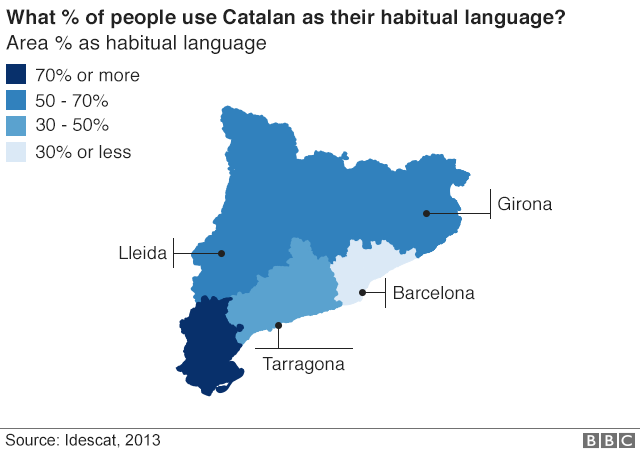
This often comes as a surprise to many outsiders who are not familiar with the situation in Catalonia: the majority of Catalans, especially of those living in Barcelona province (about 75% of all Catalans live in Barcelona province), do not communicate in Catalan but use Spanish as their primary language of communication. And yet, calling the switch board of the regional health service (CAP), you are only greeted in Catalan; some utility bills you only receive in Catalan; work contracts at some public universities are only provided in Catalan (even to foreign researchers); public cultural subsidies only go to theatres or authors who perform and write in Catalan; local authorities subject all foreigners applying for the Spanish nationality in Catalonia to an (illegal) Catalan language test; public libraries predominantly stock books in Catalan, and if you try to donate books in Spanish, they will only accept them if they have the Spanish civil war (i.e., the victim role-enforcing suppression of Catalans by Franco) as their subject; and even the local tax authorities and many municipalities provide their official forms and information in Catalan only. Asked for Spanish versions, they will often decline, claiming that those are “out of print”.
These are just some of my personal experiences, but they clearly illustrate the level of daily discrimination faced by native Spanish speakers in Catalonia. This systematic suppression of the Spanish language and culture in the public domain effectively degrades native Spanish speakers (so at least half the population) to second class citizens, and places the independentists’ claim of a suppression by Madrid in an entirely different light. Nonetheless, the myth of a cultural suppression and economic exploitation by Madrid persists, and is being carefully groomed by successive Catalan governments, as some Catalans clearly prefer this victim role, allowing them to assign blame to someone else, rather than having to take responsibility for their own shortcomings (Catalonia has its fair share of political corruption, nepotism, financial scandals, and mismanagement).
Whenever some Catalans feel suppressed by Madrid, they should also not forget that if Catalonia were located in centralist France, both the Catalan language and culture would have ceased to exist centuries ago.
Claim 2: Right to self-determination
Nevertheless, this imagined suppression by Madrid leads to the widespread believe that Calalonia has the UN-given right to self determination, thereby justifying any unilateral declaration of independence. The recently passed independence law states that Catalonia has “the inalienable and indefeasible right to self-determination” and that this has been recognized by international law. The contrary is true, however. While such a right to self-determination indeed exists, it is limited to “colonial or other forms of alien domination or foreign occupation”7. The UN resolution 50/6 goes on to state that “this shall not be construed as authorizing or encouraging any action that would dismember or impair, totally or in part, the territorial integrity or political unity of sovereign and independent States conducting themselves in compliance with the principle of equal rights and self-determination of peoples and thus possessed of a Government representing the whole people belonging to the territory without distinction of any kind.” In other words, the right to territorial integrity and political unity always trumps the right to self-determination in countries that are civil democracies, i.e., where all people have equal and fair representation through their right to vote and are protected from undue persecution. Wanting to pay less taxes, is thus no argument for invoking the right to self-determination. Ironically, just a side note, local leader Puigdemont included a phrase about the indivisibility of Catalonia in the new Catalan constitution, while completely ignoring the exact same phrase in the Spanish national constitution, a constitution which had been approved per legal referendum in 1978 by 95% of Catalans by the way8.
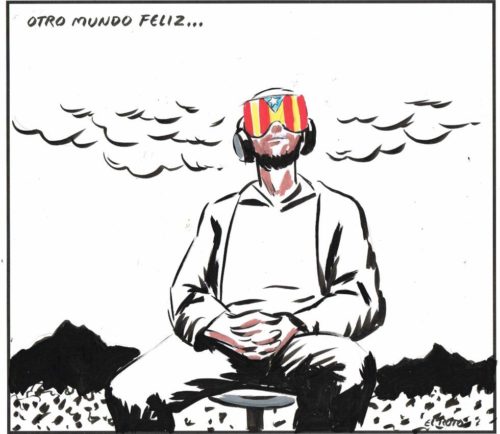
Claim 3: Catalonia is alimenting the rest of Spain
Another legend that is being perpetuated is that Catalonia is feeding the rest of Spain, and that all problems would go away once independence was achieved. Also here, the claim does not hold up against the facts.
This table provides the GDP of Catalonia and Spain (in billions of Euros) for the years 2011-2015 from Eurostat9
| 2011 | 2012 | 2013 | 2014 | 2015 | |
|---|---|---|---|---|---|
| Catalonia | 200 | 195 | 193 | 196 | 204 |
| Spain | 1070 | 1039 | 1025 | 1037 | 1079 |
Given that Catalonia has a population of 7.52 million (out of a total of 46.56 million Spaniards),
the average share of Catalonia’s GDP is 18.8%, and thus only 2.6% higher than its share of the Spanish population
The claim of Catalonia feeding the rest of Spain comes crashing down entirely, if we look at the GDP per capita in purchasing power standards for 201710.
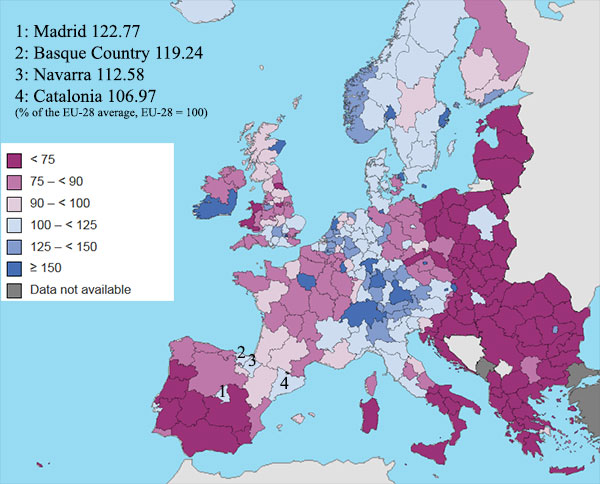
Data show that
Catalonia’s GDP per capita is about 7% above the EU average, but only 4th in Spain, just above their neighbour Aragon, but below Navarra, Madrid, and the Basque Country
This number also takes into account where companies have their financial seat, i.e., where they pay their taxes. With over 500 companies having left Catalonia already in the wake of the current crisis11, among them some heavy weights like the Caixa and Sabadell banks, or gas supplier Fenosa, Catalonia’s ranking within Spain and also Europe is likely to drop even further and unemployment may increase as a result.
So economically, if anything, it is more like a North-South divide in Spain (much like in Italy), rather than a Catalonia and the rest divide (as propagated by the local government), or a capital and the rest divide (like in centralist France). It is true that Catalonia is still richer than Andalusia or Extremadura, and that transfer payments take place from the rich to the poor regions; these transfer payments are not limited to Spain, however, and take place in many European countries12, because they are at the heart of European solidarity and the EU. Using them as a justification for independence is rather revealing of the true underlying motives behind this campaign: more for me and less for others.
Claim 4: The overwhelming majority of Catalans wants independence
This claim has been perpetuated not only by the local government, but was also echoed by some of the international media outlets. Fact is, that despite years of one-sided propaganda, the pro-independence parties only received 47.78% of the popular vote in the 2015 elections (see above). Despite gaining less than 50% of the vote, they still obtained a comfortable absolute majority of 53.3% of the seats in the Catalan parliament. This is due to a highly skewed electoral system, favouring rural over urban areas. For instance, in the 2015 elections, only 15,322 votes from Lleida were needed to obtain one parliamentary seat, while a seat from Barcelona required a whopping 36,282 votes. Effectively, this means that people living in Lleida get more than 2 votes per person, while people in Barcelona just have their 1 vote13.
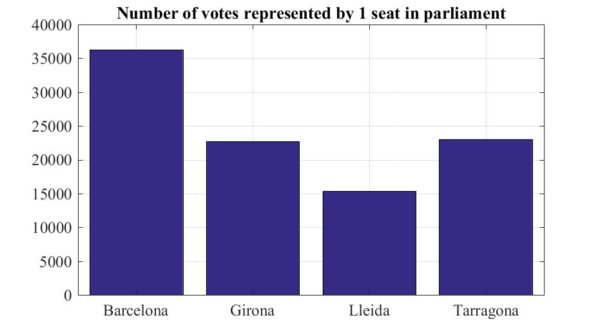
So while about 75% of all Catalans live in Barcelona province, they are represented by only 63% of seats in parliament. At the same time, 15% of the Catalan electorate living in the Lleida and Girona provinces, are represented by a disproportionately high 24% of seats in parliament. If we look at the approval rating of the indepentist coalition (JxS + CUP) in these four Catalan provinces, it becomes clear how, with just 47.78% of votes, the independence camp was able to obtain a comfortable majority of 53.3% of parliamentary seats.
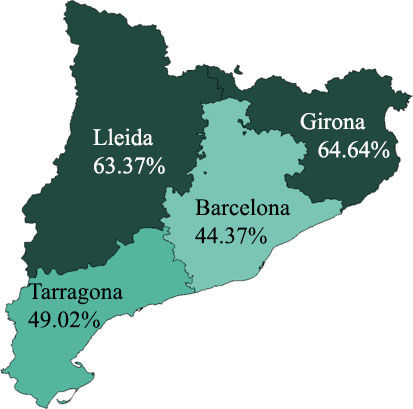
In light of these numbers, how do people who still argue with the democratic right to self-determination (see Claim 3 above) answer the following questions: what about the right to self-determination for the people living in Barcelona province who clearly reject independence from Spain? Should they (and the people in Tarragona) be forced into independence against their will, and only because a skewed electoral system gave the independentist provinces of Lleida and Girona a disproportionately high representation in parliament?
Well, be that as it may, not quite two years after the election, by July 2017, the percentage of Catalans in favour of independence had dropped by 7%. A survey by the Catalan government from July 2017 found that only about 41% of Catalans supported independence 14, and in the independence referendum on 1 October 2017, 65% of people either voted with “no” or followed Madrid’s advice and abstained entirely (60% abstention), thus only about 35% of the total electorate voted with “yes” in the independence referendum.
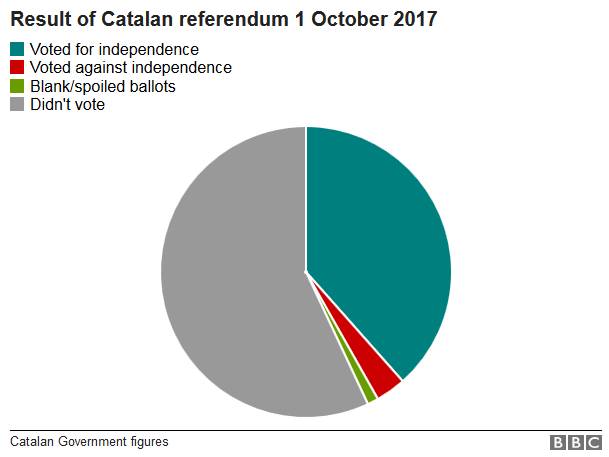
This did not deter the local administration from sticking with their separatist agenda and unilaterally declaring independence this week. Given the above figures, this is more akin to a coup d’etat than to a democratically legitimated process.
And now, what?
It is difficult to imagine any other country in Europe that would have tolerated for this long a regional government engaging in secessionist behaviour, anti-central government indoctrination of the local population, and misappropriation of public funds to pay for it all. Given the damage brought to Catalonia’s and Spain’s reputation in the world, having demonstrated that the region is not as politically stable or mature as many people would have thought, plus the ongoing exodus of companies, it would appear that the Catalan government has brought more harm than good to Catalonia (and to Spain as a whole). It is therefore not far-fetched to assume that the future will hold indictments for those responsible. Rumour has it, however, that local leaders already have some houses prepared in the French Roussillon region (or Northern Catalonia as they like to call it), as a possible seat of a government in exile. It is highly doubtful, however, whether France would be willing to provide a stage for such a circus.
While most locals have become so bored with the topic, that they simply flap their hands and roll their eyes at the mere mention of Catalan independence, the present situation is rather enlightening in that it provides a text book example of what happens to a society, where politicians need to fuel sentiments of nationalism and xenophobic scapegoating in order to disguise their own incompetence and extend their reign in power. After years and years of fuelling feelings of national superiority, of systematically suppressing the use of the Spanish language in schools and public spaces, of withholding funding from any artist or theatre company whose themes or forms of expression were not deemed to align with the Catalan point of view, the climate is increasingly one of hostility and tension. We should not leave unmentioned the role played by Madrid in this spectacle, who did nothing to diffuse the situation but, on the contrary, used every opportunity to pour more oil on the fire.
A realistic danger is that we may get two parallel societies living in two different realities: one, where the majority of people continues to live in Spain; and another where a small but still sizeable group of hard core nationalists, believe that they live in an independent Catalonia. This may even culminate in the creation of some underground terrorist groups, à la ETA in the Basque Country.
“Nationalism is an infantile disease. It is the measles of mankind.” – Albert Einstein
Parallels with Scottish independence vote
The parallels with Scotland are striking. There is a very outspoken and even militant “yes” camp, that bullies a majority opposition into silence. Unlike in Scotland, however, there is no rational discussion in Catalonia of the pros and cons of independence, as the pro camp immediately defames all those opposed to independence as fascists and monarchists. This narrow-mindedness is typical for people susceptible to nationalistic or religious ideologies – both are irrational constructs that take advantage of people’s gullibility, claiming to posses the only and absolute truth. A debate about the real issues, including some of the legitimate concerns, such as the negative impacts on some people’s lives (e.g., exiting the EU and subsequent exclusion from the common market and free movement, etc.), are irrelevant to these mono-thematic yes-camp monkeys.
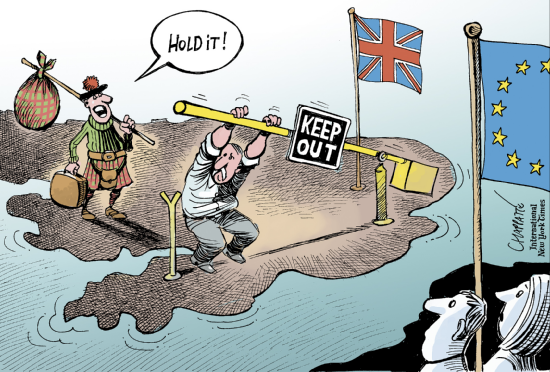
The not-so democratic side of Catalan separatism
As with Scottish independence, the public space in Catalonia only allows room for the “Yes” camp. If someone dares to post fliers, or opinions against independence, they would be removed, using violence where necessary. For instance, a group of students at Barcelona’s Autonomous University, who wanted to hand out fliers on campus to start a more rational debate about the pros and cons of independence, had to be escorted off campus in order to protect them from some violent fellow students, who apparently thought that uttering an opinion that did not match their own justified the use of violence15. So people campaigning for independence with the slogan of “democracy”, are engaging in the suppression of the democratic discourse in order to achieve their goal. This reminds me of the religious bigots, who use violence to spread the word of peace and forgiveness. Or how about the latest strategy of the Trump government to battle climate change by simply forbidding the very use of the term16. Hilarious!
Unfortunately, these are by no means isolated incidents and journalist, in particular, feel the brunt of this nationalist fervour, compelling Reporters without Borders to issue a report on the oppressive climate for media freedom in Catalonia17. The suppression of opinions extends to the highest level of Catalan government, where it led to a purge18 19 of those who dared to simply utter doubts about the independence agenda, including the chief of the Barcelona police20, who was sacked for saying that he would obey the law.
The future is … bleak
It is truly bizarre that these often violent nationalists consider themselves as part of the political left. This may be based on them opposing the ultraconservative central government in Madrid and the monarchy, but simply because one opposes some conservative institutions does not automatically make one’s cause politically left or liberal in any sense of the word. Nationalism, xenophobia, and illusions of cultural identity/superiority always create divisions and exclusion, and are thus concepts that are far from being politically left. What would happen to all the flag waving, once independence would really be achieved? And I mean really achieved, i.e., through some democratically legitimated process, and not in some banana republic style unilateral declaration, after a bogus referendum without voting lists, that has been declared invalid by the very international observers Puigdemont invited? This feeling of nationalism and all the hate towards Spain will not just disappear, and Pandora’s box cannot be closed so easily.
While Barcelona was never a truly cosmopolitan city, it was always fairly tolerant and multicultural; but now, Catalonia seems to have mutated into some crude dystopian nationalist’s wet dream, deeply divided and polarized by an intolerant and small-minded government that promotes nationalist exclusion, xenophobia, and provincialism over the European ideals of an integrative, multicultural, and forward thinking society. The city of Barcelona has been reduced to a hedonistic mass tourism destination, a budget theme park for the beach bums and stag nighters, who enjoy cheap alcohol against a pretty architectural backdrop, at the expense of slave wages for locals who can no longer afford to live in their own city; rather than opt for a much more sustainable form of tourism that would attract the art and culturally minded traveller. Of course this is not surprising, considering that they have been very successful over the years at eliminating any art or culture that is non-Catalan. Unfortunately, the same holds true for science in Catalonia, where many people are nationalists first, and scientists (a distant) second. Which international researcher wants to work at an institute where the language of communication is Catalan, and where seminars are held in Catalan? If anyone is to blame for the backwardness of Catalonia, and it not achieving its full potential, then it is the Catalans themselves, who will always place national pride over everything else. There are still people who fight against the increasing intolerance and provincialism21, but right now the outlook is rather bleak. No small number of expats, many of them successful professionals who had chosen Barcelona as their base of operations, mostly because of the relatively high quality of life, are now so appalled by the political chaos and aggressive atmosphere, that they use the current bubble in housing prices to sell their flats and pack their bags, some of them after having lived here for over 10 years, and I think we probably won’t be far behind …
- https://en.wikipedia.org/wiki/Catalan_regional_election,_2015
- http://www.publico.es/politica/sondeo-opinion-no-independencia-gana-terreno-barometro-generalitat.html
- https://elpais.com/elpais/2017/07/21/inenglish/1500633835_182589.html
- https://freedomhouse.org/report/freedom-world/freedom-world-2017
- https://infographics.economist.com/2017/DemocracyIndex/
- http://www.catalannews.com/culture/item/50-7-of-catalans-usually-converse-in-spanish-and-36-3-in-catalan
- UN resolution 50/6: http://www.un.org/documents/ga/res/50/a50r006.htm
- https://en.wikipedia.org/wiki/Spanish_constitutional_referendum,_1978
- http://ec.europa.eu/eurostat/web/national-accounts/data/main-tables
- http://ec.europa.eu/eurostat/statistical-atlas/gis/viewer/?year=&chapter=06&mids=BKGCNT,C06M01&o=1,1&ch=ECF,C06¢er=50.03696,19.9883,3&
- http://www.financeapprise.com/500-companies-left-catalonia/
- e.g., https://en.wikipedia.org/wiki/Equalization_Payments_in_Germany
- with data from https://es.wikipedia.org/wiki/Elecciones_al_Parlamento_de_Catalu%C3%B1a_de_2015
- http://www.publico.es/politica/sondeo-opinion-no-independencia-gana-terreno-barometro-generalitat.html
- http://www.politico.eu/article/catalonias-muted-anti-independence-voices/
- https://www.theguardian.com/commentisfree/2017/aug/08/trump-administration-climate-change-ban-usda
- https://rsf.org/en/news/rsf-publishes-report-respect-media-catalonia
- https://elpais.com/ccaa/2017/07/25/catalunya/1500976984_724969.html
- https://www.theguardian.com/world/2017/jul/05/splits-catalonia-pro-independence-campaign-before-key-vote
- https://elpais.com/elpais/2017/07/19/inenglish/1500451193_761976.html
- https://elpais.com/elpais/2017/07/24/inenglish/1500882427_500190.html

As someone who also lives in Barcelona I agree 100% with what you wrote. The new president Quim Torra is even on record for saying that native Spanish speakers have a “genetic deficiency” (as opposed to the chosen Catalan people). Disgusting! I really do not want to live in a place any longer where almost 50% of people vote for such racists.
I concur with your observations. Just to add a small personal experience. Recently, I was admitted to a local hospital in Barcelona for a small procedure. Upon admission, I was asked whether I understand Catalan. I said “no”, they took down the answer in my sheet, and yet, all reports, doctors diagnoses and reports, text messages to remind me of appointments, etc. arrive in Catalan and Catalan only. The level of institutionalised discrimination has reached absurd levels. They are prepared to endanger people’s safety in order to push their nationalist agenda. Really repugnant!